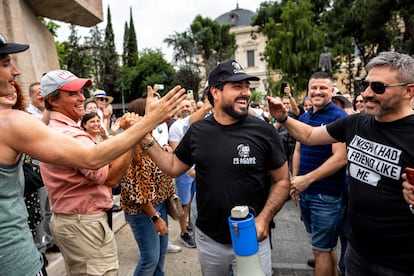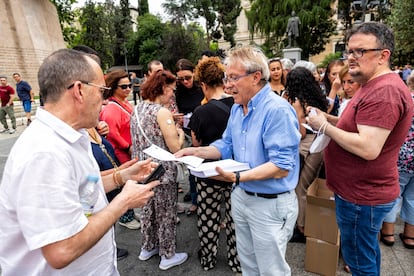Who is Alvise Pérez, the anti-system Spaniard who has obtained three seats in the EU Parliament?
The 34-year-old from Seville heads a group called The Party’s Over that rails against migrants and wants to build the largest prison in Europe. He’s been sued multiple times and has a big online following despite his low profile on traditional media

“We must destroy the system and rebuild it from scratch.” “If there is a narco-terrorist, I don’t want him to be chased down, I want you to get him with a submachine gun.” “There are more and more illegal immigrants who we don’t know whether they are rapists.” “The moment a squatter enters your house, off to jail with them.” “Everything that political parties touch becomes corrupt.” “I don’t trust the Post Office. I am the only candidate who has asked for people not to vote for me by mail.” “I would rather bleed to death than betray the Spanish people.” “Journalists: media information whores.” “We are not extremists. We are patriots fed up with political parties.”
All of the above are phrases uttered by Alvise Pérez and collected from different interviews on YouTube channels during the campaign for the EU elections that ended on Sunday.
Luis Pérez Fernández, a 34-year-old from Seville better known as Alvise, has been the most searched-for candidate on Google in the last seven days in Spain, according to data from the search engine itself. On Sunday, he received the backing of 796,560 Spanish voters, allowing him to secure three seats in the European Parliament with 4.58% of the ballots.
Alvise leads a group called Se Acabó la Fiesta (The Party’s Over). Technically it is not a political party but a group of citizens who temporarily associated with the sole purpose of running for elections, in this case for the European Parliament; doing so required collecting at least 15,000 signatures.
Some of his statements bring him close to the president of El Salvador, Nayib Bukele, whom he says he admires: he intends to build the largest prison in Europe on the outskirts of Madrid. “Even a person who has a gang tattoo: you’re going to fucking jail. If we have to put 40,000 guys in there, we will put them in there [...] And if the U.N. shows up, I’ll laugh in their face.” With hardly any coverage from traditional media, where did Alvise find his traction?
Alvise, 34, was born in the Spanish city of Seville. He studied political science at the distance university UNED, but did not finish his degree. At the age of 22 he moved to the United Kingdom, where he worked for the Liberal Democrats. It was there that he was appointed delegate of the International Federation of Liberal Youth (IFLRY), as he himself explained in an interview in La Razón in 2021. “I gained a good reputation, and one day I received a call from human resources from Ciudadanos [Spain’s liberal party Citizens].” Ciudadanos offered him the position of chief of staff for Toni Cantó, who at that time held a seat in the regional parliament of Valencia (2016-2019). Cantó and Alvise followed each other on social media. But Pérez did not feel comfortable with some of Ciudadanos’ messages, especially regarding gender violence, and he quit.
He then moved to Madrid and devoted his time to crafting an online presence. In a conversation with EL PAÍS in 2021, he said that he had a team of video producers and lawyers. The former help him create content; the latter help him defend himself from the consequences. Alvise has so far been sued by Spain’s former public works minister José Luis Ábalos, by the current transportation minister Óscar Puente, and by La Sexta journalist Ana Pastor.
“These have been the perfect elections for him because people are fed up and he is very skilled with social media,” says a former member of Ciudadanos who worked with Alvise Pérez during his time in Valencia.

The people who came out for Alvise’s rally in Madrid’s Plaza de Colón last Friday were a varied crowd. There was a 27-year-old who described Pérez as “a guy who attacks corruption. I have been following him for four years.” A 64-year-old man who admitted to normally voting for the center-right Popular Party (PP) said: “He gives everyone a hard time and this can be a trigger.” Two women aged 40 and 43 said: “He is not a candidate. It’s a different way of doing politics. He wants to change the system. We have been following him since the pandemic. A change is needed because [Spain’s far-right party] Vox has not done anything.” Alvise addressed the 1,000 or so people with a megaphone in one hand and wearing a black t-shirt with a QR on the back that points to his Telegram channel.
Alvise has openly acknowledged that he ran for office to seek immunity from prosecution in Europe. According to elDiario.es, he has two open cases that would have to go straight to the Supreme Court if he obtained a seat. He has donors who pay for everything. “People like to put money in so I can continue reporting and not be drowned out by legal cases,” he said in an interview. He has an account on Patreon, a crowdfunding system, where more than 600 users have paid him a monthly amount. A well-known financial backer is Hazte Oír, an ultra-Catholic association. Alvise has led anti-abortion protests in Madrid clinics with them: the last one was last year.
Strong on social media
Between all his social media accounts combined (Instagram, Facebook, TikTok, Telegram) he has 1,800,000 followers. A recent study by Spain sociological studies agency CIS shows that 54.9% of Spaniards use social media to obtain their information.
Alvise’s account on X (formerly Twitter) is currently suspended. In March 2017 he created an Instagram profile (the most widely used social media platform in Spain) that has 849,000 followers, more than any political party in the country. On June 1, 2017, he also launched a Facebook page where he has 223,000 followers, almost the same as the governing Socialist Party (PSOE).
On September 24, 2018, he also created a Telegram channel where his first message was: “I am keeping this channel where I will be able to prevent blocks on Facebook and Twitter, and where I will release different audios about politics and current affairs.” Since then, rather than merely sharing information, he has tried to create a community, making his followers feel that they are part of a unique movement: “This channel is all we have left, my friends.” “They’re going hard after any criticism of the left. It’s a witch hunt.”
Another one of his specialties is harassing the press. He points out journalists with names so that his followers can attack them on social media. The latter all call themselves “squirrels.” They take photos of politicians and journalists, then send and share them. His Telegram channel now has 480,000 members, up from 50,000 in 2021. That is again more than any political party in Spain.
On election day this past Sunday, Alvise harangued his fans with messages that pointed to possible electoral fraud. He also promised to raffle his salary among his followers. They are identical strategies to those used by Argentinean president Javier Milei in the first round of the elections there.

Macarena Olona, a former legislator for Vox, says in a telephone interview that the common denominator among Alvise’s diverse followers is their disappointment with Vox. “It has not met their expectations and they see hope in him.” A former senior PP official who is close to him claims that he receives donations in a “brutal way.” “The strategy of setting everything on fire benefits only himself. He has a voting niche of 40-year-olds and younger. I know a lot of people who are going to vote for him.”
Added to this is the fact that the European elections are always very favorable to new groups, as was the case with Podemos in 2014, and the loss of Spanish voters’ confidence in traditional parties, especially in the last five years, according to the CIS.
Stribor Kuric, a researcher at the Reina Sofía Youth Center, says that the latest studies they have published reveal a polarizing trend among the population between 15 and 29 years old. “Boys and girls tend towards the extremes. The boys, to the right, and the girls to the left. The breakdown of social consensus in the public space has had an influence.” Kuric also highlights network algorithms. “If the content published on a network generates a lot of rejection, it becomes more viral and you have more visibility and reach more people.”
“The key is that Alvise has created a collective entity,” says Raúl Magallón, a professor at Carlos III University who specializes in disinformation. “We were used to the fact that the gateway to politics came from the political parties, and now it comes from social media.” The next step, according to Alvise himself, is running in national elections in Spain.

Sign up for our weekly newsletter to get more English-language news coverage from EL PAÍS USA Edition
Tu suscripción se está usando en otro dispositivo
¿Quieres añadir otro usuario a tu suscripción?
Si continúas leyendo en este dispositivo, no se podrá leer en el otro.
FlechaTu suscripción se está usando en otro dispositivo y solo puedes acceder a EL PAÍS desde un dispositivo a la vez.
Si quieres compartir tu cuenta, cambia tu suscripción a la modalidad Premium, así podrás añadir otro usuario. Cada uno accederá con su propia cuenta de email, lo que os permitirá personalizar vuestra experiencia en EL PAÍS.
¿Tienes una suscripción de empresa? Accede aquí para contratar más cuentas.
En el caso de no saber quién está usando tu cuenta, te recomendamos cambiar tu contraseña aquí.
Si decides continuar compartiendo tu cuenta, este mensaje se mostrará en tu dispositivo y en el de la otra persona que está usando tu cuenta de forma indefinida, afectando a tu experiencia de lectura. Puedes consultar aquí los términos y condiciones de la suscripción digital.









































